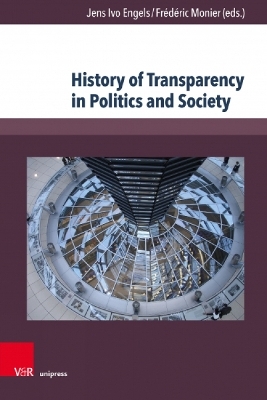History of Transparency in Politics and Society
Seiten
2020
|
1. Edition
V&R unipress (Verlag)
978-3-8471-1155-9 (ISBN)
V&R unipress (Verlag)
978-3-8471-1155-9 (ISBN)
Transparency has a long history, but it is ambiguous in its effects
Today, the demand for transparency is omnipresent. In particular, transparency is considered a prerequisite for good governance, for political participation and democracy. On closer inspection, however, transparency proves to be ambivalent. For complete transparency has not yet been achieved anywhere. Moreover, measures to increase transparency can have the opposite effect and stir up mistrust. Historians are just beginning to discover this topic. The volume assembles contributions covering European history since the 19th century. The contributors focus on political and cultural history, but include also economic and media history as well as the history of ideas. They analyse publicly debated demands and efforts for transparency, conceived as the access to information or ist disclosure.
Today, the demand for transparency is omnipresent. In particular, transparency is considered a prerequisite for good governance, for political participation and democracy. On closer inspection, however, transparency proves to be ambivalent. For complete transparency has not yet been achieved anywhere. Moreover, measures to increase transparency can have the opposite effect and stir up mistrust. Historians are just beginning to discover this topic. The volume assembles contributions covering European history since the 19th century. The contributors focus on political and cultural history, but include also economic and media history as well as the history of ideas. They analyse publicly debated demands and efforts for transparency, conceived as the access to information or ist disclosure.
Dr. Jens Ivo Engels ist Professor für Neuere und Neueste Geschichte an der Technischen Universität Darmstadt. Seine Forschungsschwerpunkte liegen auf der Geschichte der Korruption, Umweltgeschichte, Geschichte von Infrastrukturen sowie Monarchie.
Dr. Frédéric Monier ist Professor für Zeitgeschichte an der Universität Avignon. Er beschäftigt sich mit der politischen Geschichte der Dritten Französischen Republik mit Schwerpunkten auf politische Korruption, politische Patronage und Furcht vor Komplotten.
| Erscheinungsdatum | 09.08.2020 |
|---|---|
| Co-Autor | Jens Ivo Engels, Frédéric Monier, Olivier Meuwly, Silvia Marton, Alexandra Iancu, Sandra Zimmermann, Sjoerd Keulen, Ronald Kroeze, Florian Altenhöner, Martin Mainka, Harm Kaal, Vojin Saša Vukadinović, Eric Dehay, Natalie Lévy |
| Zusatzinfo | with 2 figures |
| Verlagsort | Göttingen |
| Sprache | englisch |
| Maße | 160 x 235 mm |
| Gewicht | 406 g |
| Themenwelt | Sachbuch/Ratgeber ► Geschichte / Politik ► Allgemeines / Lexika |
| Geschichte ► Teilgebiete der Geschichte ► Kulturgeschichte | |
| Geschichte ► Teilgebiete der Geschichte ► Sozialgeschichte | |
| Sozialwissenschaften ► Politik / Verwaltung ► Politische Theorie | |
| Schlagworte | 19. Jahrhundert • 20. Jahrhundert • Democracy • Demokratie • history of ideas • Ideengeschichte • media history • Mediengeschichte • Politics • Politik • Transparency • Transparenz |
| ISBN-10 | 3-8471-1155-8 / 3847111558 |
| ISBN-13 | 978-3-8471-1155-9 / 9783847111559 |
| Zustand | Neuware |
| Haben Sie eine Frage zum Produkt? |
Mehr entdecken
aus dem Bereich
aus dem Bereich
der stille Abschied vom bäuerlichen Leben in Deutschland
Buch | Hardcover (2023)
C.H.Beck (Verlag)
23,00 €
vom Mittelalter bis zur Gegenwart
Buch | Softcover (2024)
C.H.Beck (Verlag)
12,00 €
eine Geschichte der Welt in 99 Obsessionen
Buch | Hardcover (2023)
Klett-Cotta (Verlag)
22,00 €




